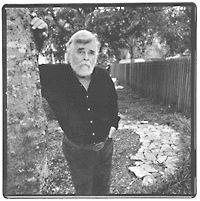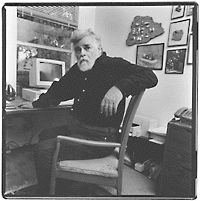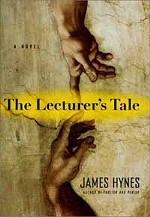A Double Shot of Wry
Author Neal Barrett, Jr.
By Mike Shea, Fri., Nov. 28, 1997
|
|
From this comfortably appointed South Austin home, Barrett has spent the last five years carving out a niche for himself as a leading purveyor of crime fiction with a trenchantly humorous twist. Although largely identified with his numerous science fiction-ish titles, the 1992 publication of Pink Vodka Blues represented another major genre-shift for a writer who had made it his custom to cross-pollinate the world of fiction. It introduced him to an entirely new audience and a new clique of reviewers who sat up and took notice. And it sold pretty damn well.
Pink Vodka (available in a paperback edition as of October) was followed by Dead Dog Blues and then the two volumes of the Wiley Moss series: Skinny Annie Blues and his most recent Bad Eye Blues (see sidebar). Their pervasively dark humor and ricochet storylines would make them at home on a shelf with fellow travellers like Charles Willeford, Carl Hiaasen, and Elmore Leonard. The rave reviews he's collected to date haven't translated into megaseller status. And although Pink Vodka was optioned in January of this year ("I got a six-figure number out of that"), Barrett hasn't yet landed in the circle of writers who command absurd amounts of Hollywood money à la Get Shorty. His 37 years of genre-busting writing haven't gotten him the cover of People magazine yet.
Pound-for-Pound...
In the compact room where Neal Barrett, Jr. writes and reads, one wall is covered by an unpretentious bookcase of a fair size. The middle and leftmost sections are jammed with reference volumes and books by friends. The set of shelves on the right overflows with volumes in all shapes, sizes, and colors -- hardbacks, paperbacks, oversized books, comic books, anthologies. A quick look-through finds quirky literary fiction like his acclaimed 1991 novel The Hereafter Gang cheek-to-jowl with hardcore science fiction along the lines of Stress Pattern and the Aldair paperback series from the Seventies. The Blues mysteries share space with short story collections (Slightly Off Center). There are over 863 pages of comic scripts running the gamut from Batman to Jurassic Park to Weird Business. And novelizations of TV shows and movies including Babylon 5: The Touch of Your Shadow, the Whisper of Your Name, Judge Dredd, and Barb Wire. In all, over forty-something novels and countless miscellaneous works.
This is what Neal Barrett's been up to these last 37 years. "Neal is a writer," offers Rick Klaw, managing editor of Austin's Mojo Press, in a tone that makes it very clear he considers this a compliment of the highest order. "Neal doesn't know how to miss a deadline. He's the consummate professional." While he's obviously no stranger to muse and inspiration, he's long been accustomed to writing as a craft, the act of assembly by which sentences become stories, stories become books, and books become a livelihood.
In the boxing world they use the phrase "the best fighter pound-for-pound" when they want to debate skills between boxers in different divisions. Ignoring genre barriers and prejudices, Barrett could be, pound-for-pound, one of the best pure writers working today. He writes seamless and seductive prose and dialogue that crackles with wit and intelligence. His close friend Joe Lansdale, a writer of no mean skill, calls Barrett "one of the best writers I've ever read." Discount the statement 25 percent for reasons of affinity -- and that's still high praise. Heaven's in Oklahoma and Everything Costs a Nickel... In 1986, years before entering the suspense fiction game, Barrett's semi-sci-fi novel Through Darkest America collected some heady reviews and he followed up with Dawn's Uncertain Light in 1989, which began to lead him into new territory. His gut was calling him one way. Fiscal necessities were calling him the other way. He followed the muse, commercial consequences be damned. In his words: "I said that everything that I wanted to do I was going to do. Whether you like it or not, it was what I liked."
The result was The Hereafter Gang, the book that critics and colleagues, friends and fans nearly unanimously cite as his finest to date. Barrett believes the book embodies his spirit. "If I'm dying tomorrow," he says, "remember me with this one." The Washington Post agreed, calling it "one of the great American novels." It's a richly rewarding and outrageously funny work, equal parts Harry Crews and John Irving, to draw comparisons. Sadly out-of-print and in need of a publisher for a trade paperback edition, it traces the posthumous odyssey of Doug Hoover, an unhappy Texas adman who dies and is reincarnated across the Red River in Oklahoma "with minor English poets, western outlaws, advertising men and good-looking girls. Everything costs five cents -- cars or ice cream cones. And he can slam dunk a basketball. This is my heaven," Barrett emphasizes. "You go get yours."
With great notices and a great book to back them up, what could go wrong? For starters, your publisher could be a small company in California who, despite their best intentions and efforts, are simply too far from the publishing centers in New York and without the resources of the bigger book houses. The experience obviously stung Barrett, but he has been around the block too many times not to know how the game works. "If you happen to be published by Simon & Schuster [and you get great reviews] you might go somewhere. When you do it for a small press everyone says `Wow, that's nice' and then nothing happens. Where do you go from there? I didn't go anywhere, I just kept working."
Unable to capitalize on his critical success, the great breakthrough became another stop on the road, with the added benefit of great clippings and a book for the shelf that could serve as an enduring legacy.
Which is why he's not right in the head.... His bio carefully notes that he was born in San Antonio "not in the shadow of the Alamo but right out in the sun somewhere, which is why he is not entirely right in the head." He moved to Oklahoma when he was five and lived there long enough to take a degree at the University of Oklahoma. The Texan he is now was formed by the Okie he was then. As a child, Barrett tried to create comic books but found that he couldn't draw so he just drew dialogue balloons. "I believed that I invented prose fiction for a while. I never did want to do much of anything else."
Flash forward to Dallas, Texas in the Sixties where OU grad Barrett, Jr. is holding down a series of desks in a succession of corporations. "I was employed but I wasn't an employee. I was miserable. The last job I had was about 1973 when I was director of promotions for Braniff (the now-defunct airline). I stole paper and used the Xerox a lot. I wrote a book when I was supposed to be working there. I think that's the corporate contribution to the arts -- you use the pencils and typewriters and Xerox while you're there."
Despite holding down a day job in the early years, he professes that he never knew years of bitter struggle and rejection. After fewer than a dozen tries he got a story published in 1960. Then another. And yet another. Time passed and he built a reputation and a bibliography. He was regularly included in the major short story anthologies and picked up some great reviews (most offering new synonyms for "weird" and "offbeat") and a few awards along the way. He crossed genre lines with impunity and kept on going. How many writers have had the same short story anthologized in Year's Best Science Fiction and also named runner-up for the Best Western Short Story of the Year by the Western Writers of America? Typical Barrett behavior.
County-wide Sci-fi...
|
|
Of his science fiction days, Barrett offers this, "I was accused of and admitted that instead of galaxy-wide, I wrote county-wide science fiction. Because I figure that even in the year 4799 in some far galaxy the whole galactic empire could be clashing but you're still going to be running a snow-cone machine and most of your problems will be getting ice or coconut flavoring. I don't know much about science and I've always wanted to write about people." He made it his challenge to uncover veritable ecosystems of deviance out on the sidewalk and just down the block.
Like Floating in a Pool...
Somewhere along the way, he got into the comic market, which he still works in regularly and admits to enjoying tremendously. "Comics is kind of like floating around in a pool. Hardly any effort."
Rick Klaw, who has published a number of Barrett's comic scripts at Mojo Press agrees: "Comics come easily to Neal because he thinks very visually. My favorite thing that Neal's ever done for me is That Hell-Bound Train, an adaptation of Robert Bloch that's in Weird Business. He's a great collaborator, very sympathetic to what other people are doing." Alpha Males of
Gonzo Fiction... In September of this year, Neal Barrett took the stage in the massive Marriott RiverWalk ballroom at WorldCon 1997, the 55th World Science Fiction Convention. His role was to act as emcee for the Hugo Awards, one of the most prestigious sci-fi awards. Nearly 4,000 people were in attendance and a live Internet audience may have swelled that number 50 times over. It was no small honor to be the "Honored Master of Toasts," as he was dubbed by the organizers.
Typically, Barrett insists he was only invited to host because "[I'm] always willing to make an ass out of myself for a limited amount of time." Which would at least partially explain the fashion statement made by the leather WWI flying cap topping off his ensemble. And his frequent references to himself as a "writergod." And this bit of atypical podium humor, "René Descartes walks into a bar and orders a beer. After he finishes, the bartender asks if he'd like another. `I think not,' he says, and vanishes in a puff of smoke."
Earlier that day, Barrett and Lansdale shared the stage at a panel called "Sometimes the Bear Eats You (Gonzo Texas Mystery Writers Claimed by Sci-Fi)." The latter's rapid-fire delivery is in stark contrast to Barrett's laconic and surrealistically folksy manner. He's not unlike the slightly crazy relative who can't quite mind his manners at Thanksgiving dinner -- he cracks the kids up and drives Mom nuts. They're clearly working the room in a friendly but competitive game of can-you-top-this. Lansdale serves up a mile-a-minute rendition of his encounter with his neighbor's blind gardener, weed trimmer in hand, who asks for help. I don't know, it looks pretty good to me, says Joe. Barrett volleys and scores the biggest laughs by riffing on clippings from the daily paper ("apparently a bowling ball factory burned down last night -- I suspect the Sisters of the Perpetual Spare might have fired it up"). The moderator finally gives his benediction pronouncing the pair the "alpha males of gonzo fiction." Nobody dissents. The crowd eats it up.
Do the Eskimos have 1000 words for friend? "Neal is the best friend you can have. Period. End of paragraph." So says Pierce Watters, publisher of TSR Publications, best known for bringing Dungeons & Dragons to the world. He met Barrett in 1972 and eventually wound up as his neighbor in Fort Worth. In a brief conversation, he repeats the same sentiment several times, in several different ways. I learn many new synonyms for friend.
"Neal's loyal," agrees Lansdale. "He's like a brother to me, more than friend. I first met him in the Seventies. I was a big fan." Barrett, who dedicated Bad Eye Blues to "Joe R. Lansdale, my evil twin" reciprocates. "Joe's mostly my resident nut friend. We sometimes think on the same scale." Are they writers of a school or just pals who get lumped together out of convenience and laziness? Lansdale's take: "We do seem to get mentioned in the same breath a lot. I don't know if we're coming from the same place or going to the same place. Maybe we're driving the same car." Their closeness is quickly apparent. After my first brief chat with each I note three anecdotes that each brought up independent of the other.
Barrett is a self-deprecating soul who seems happiest poking fun at himself. I suggest to Lansdale that Barrett might have climbed higher and faster through the years if his ego were as outsized as his skills. Is he as humble as he seems? "Neal doesn't think," he replies in a heartbeat, "that he ever writes a bad sentence."
That is the closest I can get to a bad word out of anyone. Move over Mother Theresa, Saint Neal is coming down the track. Onward, forward, and further....
These days, he's a homebody of the first degree. When I ask if he's a man of the world, he and Ruth, his blonde and beautiful wife of 20-plus years, share a laugh, "I don't think anyone would confuse me with James Bond. I just live here with my wife and my squirrel-colored cat and the most adventurous thing I do is work in my garden and lay rocks -- move 'em around and make paths to nowhere. We love to eat out and we'll go to a movie when there's something we want to see. Once a week I'll eat Chinese food with Brad Denton and William Browning Spencer. Or Indian food with Joe when he's in town." With a wink in his voice he adds, "I have to eat with these people because I don't know anyone else."
He has a strong desire to revisit the artistic satisfaction he enjoyed with The Hereafter Gang and build on his recent commercial breakthroughs. Interstate Dreams, "another book like The Hereafter Gang but with mystery suspense that happens in Houston and Austin" is in his agent's hands. It's making the rounds of major publishers who can provide the distribution and support it will need to break through the glass sales ceiling into the land where bestsellers dwell. By way of contrast, an inquiry at Brentano's in San Antonio (a Barnes & Noble chain) finds that Barrett's current hardback is not and never was in stock. Such can be the fate of releases from smaller publishing houses.
Barrett offers a pragmatic, albeit unhappy take on the current publishing scene. "I've got a good audience. I've gotten good reviews. I don't lack for fans. People like what I do but my books need a major book house to make the numbers. An editor has a lot of problems with what to put on the jacket [of Interstate Dreams]. Is this a mystery? Is this mainstream?"
Neal Barrett, Jr. is, to all appearances, at peace with himself, but not at all complacent. He appears to be publishing more pages in more areas with more success than at nearly any other period of his career. But he obviously feels the need to get at least one more big book under his belt, and if Interstate Dreams proves to be the hybrid novel he believes it to be, he'll have another notch on his gun and another chapter for his legacy.
Time passes and then...
...Friedrich Nietzsche walks into a bar, orders a beer, and drinks it. The bartender asks if he would like another. Nietzsche says, "Are you out of your mind? Did you see what happened to Descartes?"










